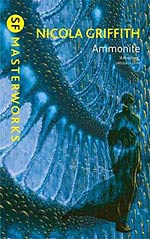
![]() alixheintzman
alixheintzman
10/14/2013
![]()
In Nicola Griffith's Ammonite, we find a world without men. If you're imagining a serene society ruled by wise matriarchs, or a planet of space-babes waiting for Kirk to rescue them, then perhaps this book is not for you. Because Griffith's world is different. Her book is about reworking the familiar ploys of science-fictions past and making them wonderfully new. It's classically science fiction, in that it pushes irreverently against the boundaries of classic science fiction.
The first few pages of the book are filled with enough airlocks, sliding doors, and food dispensers to satisfy the most rigid sci-fi fan. An anthropologist named Marghe is in space, preparing to descend to the planet Jeep. Jeep, we learn, was once colonized by the Company for its valuable resources. But then a virus swept through the settlers and killed all the men and most of the women, and the Company abandoned the project. Five years later, they've developed a vaccine and returned. Marghe is the scientist who will be simultaneously studying the natives—human women who have survived the virus for centuries and somehow managed to reproduce—and testing the vaccine. She descends into a classically colonial scene: a militarized Company base surrounded by a vast unknown planet full of preindustrial natives.
At this point, the tone shifts. Marghe leaves the safety of the base and heads north, searching for the Company scientist who disappeared before her arrival. The elements of classic science fiction fade as Marghe travels through a premodern world of nomads, sailors, farmers, and pastoralists. Her anthropological journey quickly morphs into a scramble for survival. She's kidnapped by the Echraide, a violent indigenous clan, escapes into the tundra, and gets adopted by a friendly coastal village. Along the way, several crises build: the Company seems likely to destroy the planet if the vaccine fails, but the success of the vaccine would lead to full-scale colonization and the destruction of native lifeways; the Echraidhe start a genocidal war, which threatens the Company base and the rest of the planet; and Marghe's own allegiances shift and evolve, in a complicated but familiar process of "going native." All these crises fit together in a stunning and powerful climax: Marghe standing alone on the grassy plains, between two lines of advancing soldiers, telling a story. It's an intricate plot, which improves with the second and third reading.
For the full review, and ramblings about empire and gender, please follow the link below to my book review blog.
http://theothersideoftherain.wordpress.com/